Shinjuku, located in the heart of Tokyo, is a vibrant area where dynamic cityscapes, extensive shopping experiences, delicious cuisine, and round-the-clock entertainment converge. This bustling district is a stunning blend of Japanese tradition and contemporary culture, continuing to captivate visitors from around the globe. This article aims to introduce must-visit tourist spots in Shinjuku for foreign travelers, along with useful information to enhance their visit.
Must-Visit Tourist Spots
1.Shinjuku Gyoen National Garden
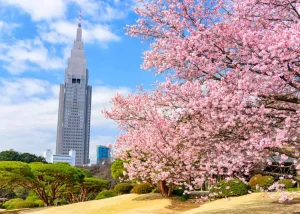
[reference:https://livejapan.com/ja/in-tokyo/in-pref-tokyo/in-shinjuku/article-a0003755/]
– A vast park that offers a tranquil escape from the hustle and bustle of Tokyo. It features Japanese, English, and French-style gardens, allowing visitors to enjoy the beauty of nature in every season.
Shinjuku Gyoen National Garden is a vast national park located in Shinjuku, Tokyo, known as a tranquil oasis away from the hustle and bustle of the city. Spanning approximately 58.3 hectares, it features various styles of gardens including Japanese, English, and French gardens, where visitors can enjoy the beauty of plants and flowers through the seasons.
History
The history of Shinjuku Gyoen dates back to the Edo period, initially part of the Naito Shinjuku area owned by a feudal lord. In the Meiji era, it became a property of the Imperial Family, used particularly as an agricultural garden for the royals. After World War II, the garden was opened to the public, becoming a place of relaxation for the nation.
Garden Features
- Japanese Garden – Incorporates traditional Japanese garden aesthetics with ponds, streams, artificial hills, and stone lanterns, offering a serene landscape. It is especially beautiful during cherry blossom season, attracting many visitors.
- English Landscape Garden – Known for its expansive lawns, it is a popular spot for picnics and relaxation. The garden is planted with seasonal flowers, with the tulips in spring and cosmos in autumn being particularly splendid.
- French Formal Garden – Characterized by its symmetrical design and manicured shrubbery. The rose garden blooms with a variety of roses, filling the area with beautiful fragrances.
Visitor Information
Shinjuku Gyoen is a place where you can enjoy the beauty of various plants throughout the year, but it is especially crowded during the cherry blossom season in spring and the autumn foliage season. The park also houses rest houses and cafes, where visitors can eat and take breaks.
Access
Access to Shinjuku Gyoen is very convenient, being about a 10-minute walk from Shinjuku Station. It can also be directly accessed from the Shinjuku-gyoemmae Station on the Tokyo Metro.
Shinjuku Gyoen is a precious location that offers the beauty and tranquility of nature in the heart of the city, making it a must-visit for nature lovers, history enthusiasts, or anyone looking to spend some peaceful time amidst natural beauty.
2.Tokyo Metropolitan Government Building Observation Decks
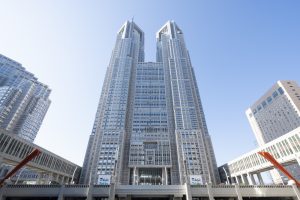
[reference:https://www.yokoso.metro.tokyo.lg.jp/kengaku/index.html]
– The observation decks on the 45th floor of the towering Tokyo Metropolitan Government Building offer free panoramic views that, on clear days, include Mount Fuji.
The Tokyo Metropolitan Government Building Observation Decks are located within the No.1 Building of the Tokyo Metropolitan Government in Shinjuku, Tokyo. These observation decks are popular spots that offer panoramic views of Tokyo’s skyscrapers, and on clear days, distant sights such as Mount Fuji and the Tokyo Skytree can be seen.
Features
- Free Access: The Tokyo Metropolitan Government Building Observation Decks are open to all visitors free of charge, making them a must-see attraction for anyone visiting Tokyo.
- Two Observation Decks: There are two observation decks, the North and South, each offering different views. The North Observation Deck is renowned for its beautiful night views and includes a cafe. The South Observation Deck is more suited for daytime views and offers particularly stunning vistas on clear days.
- Height: The observation decks are located 202 meters above ground, providing a 360-degree view of Tokyo’s skyline.
Access and Visitor Information
- Access: The closest subway station is Tochomae Station on the Toei Oedo Line, which provides easy walking access. It’s also about a 15-minute walk from JR Shinjuku Station.
- Hours of Operation: The observation decks are generally open from 9:30 AM to 11:00 PM. However, they may be closed for maintenance or special events, so checking the official website for the latest information before visiting is recommended.
Tourism Tips
- Avoiding Crowds: The observation decks can be particularly crowded on weekends and holidays. Visiting during the early hours on weekdays can be a quieter experience.
- Bring a Camera: Don’t forget to bring a camera or smartphone to capture the beautiful panoramic views of Tokyo.
The view from the Tokyo Metropolitan Government Building Observation Decks provides a wonderful opportunity to see the dynamic landscape of the city from above. Visitors can experience a new perspective of Tokyo’s cityscape, making it a worthwhile visit.
3.Kabukicho
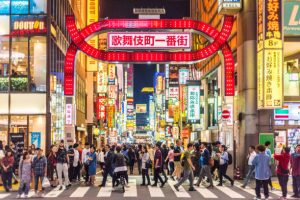
– Japan’s largest entertainment district, home to a wide variety of restaurants, bars, nightclubs, and cinemas. The neon lights at night are particularly worth seeing.
4.Isetan Shinjuku Store
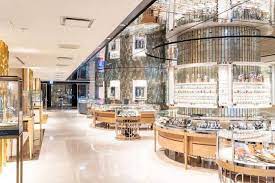
[reference:https://www.mistore.jp/store/shinjuku.html]
– A large department store where you can shop for luxury brands, offering a wide range of products from traditional Japanese crafts to the latest fashion items.
Isetan Shinjuku Store is one of Tokyo’s most prestigious and iconic department stores, located in the heart of Shinjuku, one of the city’s major commercial and administrative centers. Renowned for its high-quality products, exceptional customer service, and innovative approach to retail, Isetan Shinjuku Store has become a destination for shoppers from around the world.
Highlights
- Luxury Shopping: Isetan Shinjuku Store is famous for its wide range of luxury brands and designer goods, including fashion, jewelry, cosmetics, and accessories. The store is particularly known for its extensive selection of both international and Japanese designers.
- Food Floors: The food halls, known as depachika, are a must-visit, offering an incredible variety of gourmet foods, sweets, and delicacies from around the world, as well as high-quality Japanese products.
- Fashion and Beauty Services: Isetan provides personalized fashion and beauty services, including personal shopping assistance, style consultations, and a beauty salon. These services are designed to offer customers a tailored shopping experience.
- Art and Culture Events: The store regularly hosts art exhibitions, cultural events, and seasonal displays, showcasing both traditional Japanese culture and contemporary art.
Unique Features
- Architectural Design: The store’s architecture is a blend of modern and traditional design, creating an elegant and welcoming shopping environment.
- International Customer Service: Isetan Shinjuku Store offers services tailored to international visitors, including tax-free shopping, foreign currency exchange, and multilingual staff to assist with inquiries.
- Sustainability Initiatives: The store is committed to sustainability, offering a range of eco-friendly products and initiatives aimed at reducing environmental impact.
Tips for Visitors
- Check Event Schedules: Visit Isetan’s website or inquire in-store about current and upcoming events to make the most of your visit.
- Take Advantage of Services: Utilize the store’s various services for a more comfortable and personalized shopping experience.
- Explore Each Floor: Each floor of Isetan Shinjuku Store offers a different experience, with carefully curated selections of goods and services. Take your time to explore the diverse offerings.
Isetan Shinjuku Store is more than just a department store; it’s a cultural and shopping landmark that offers visitors a comprehensive experience of Japan’s high-quality products and hospitality. Whether you’re looking for luxury fashion, gourmet foods, or a taste of Japanese culture, Isetan Shinjuku Store is a destination that promises an unforgettable shopping experience.
5.Golden Gai
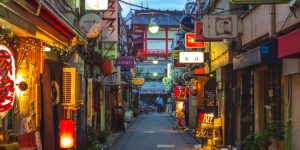
[reference:https://discoverlocal.site/lifestyle/tokyo-shinjuku-golden-gai/]
– An area filled with small bars that retain the atmosphere of the Showa period, offering a chance to interact with unique bar owners.
Golden Gai is a renowned and distinctive area located in the heart of Shinjuku, Tokyo. This area is famous for its narrow alleys and two-story buildings densely packed with tiny bars, eateries, and clubs. Golden Gai retains an atmosphere of the past, contrasting sharply with the modern skyscrapers and bustling streets of surrounding Shinjuku. It’s a place that captures the essence of Tokyo’s post-war era, offering a glimpse into the city’s rich history and culture.
Characteristics
- Tiny Establishments: Most bars and establishments in Golden Gai can only accommodate five to ten customers at a time, offering an intimate and unique drinking experience. Each bar often has its own theme and character, ranging from classic Japanese to punk rock, cinema, and more.
- Cultural Hub: Golden Gai is not only popular among locals but also among artists, writers, and actors, making it a cultural hub where creative minds gather.
- Historical Significance: Surviving the rapid modernization of Tokyo, Golden Gai is a testament to the resilience of small businesses and the area’s rich cultural heritage.
Experience
Visiting Golden Gai is like stepping into another era. The area’s narrow lanes, adorned with retro signage and lanterns, provide a stark contrast to the neon-lit streets of Shinjuku. Each bar has its own story, often reflected in its decor and ambiance. Many bar owners are friendly and welcoming, offering not just drinks but also stories and personal insights into the area’s history.
Tips for Visitors
- Respect the Locals: Golden Gai is known for its close-knit community. Visitors are encouraged to be respectful and considerate, especially given the small size of most establishments.
- Cover Charges: Some bars in Golden Gai may have a cover charge, which can vary from one place to another. It’s always a good idea to check before entering.
- Language Barrier: Not all bar owners speak English, but many are accustomed to foreign visitors and often find ways to communicate.
Recommendations
- Explore Without a Plan: The best way to experience Golden Gai is to wander its alleys without a specific destination in mind. Let curiosity guide you, and you’re likely to find a spot that resonates with your tastes.
- Visit on Weekdays: To avoid the crowds and have a more relaxed experience, consider visiting Golden Gai on a weekday.
Golden Gai offers a rare opportunity to experience Tokyo’s history and nightlife in a uniquely intimate setting. It’s a must-visit for anyone looking to dive deeper into the city’s diverse and vibrant cultural landscape.
Free Wi-Fi Spots in Shinjuku
Shinjuku offers numerous free Wi-Fi services for the convenience of tourists. Key spots include:
-
Around Shinjuku Station
– Free Wi-Fi is available in many areas inside and outside the station.
-
Tokyo Metropolitan Government Building
– Free internet access is available in several areas, including the observation decks.
-
Shinjuku Gyoen National Garden
– Stay connected to the internet even amidst nature.
There are many free Wi-Fi spots in Shinjuku, but often the speed is not sufficient, making it inconvenient to use. When visiting Japan, it is recommended to rent a Wi-Fi router.
Recommendation for Wi-Fi Router Rental
To make your stay in Shinjuku more comfortable and convenient, we recommend renting a Wi-Fi router. It’s available for rent at airports and major tourist locations, allowing you to connect to high-speed internet anywhere in Japan. Reservations can be easily made online, and both pickup and return are highly convenient. Without worrying about communication limits, you can check maps, search for restaurants, and post on social media, enriching your travel experience.

For renting Wi-Fi, “wifi-rental-japan” is recommended!
Shinjuku is a place that requires planning and information to fully appreciate its charm. Use the above spots and information as a guide to make the most of your stay in Tokyo.










